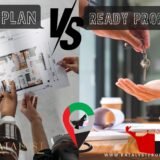- villas for sale in Dubai
- Varieties of Villas in Dubai
- Differences Between Freehold and Leasehold Properties in Dubai
- Who is eligible to purchase villas in Dubai?
- Top Places to Purchase Villas in Dubai
- How to Purchase a Villa in Dubai?
- Expenses Related to Purchasing a Villa in Dubai
- Which are the latest villas in Dubai where I can consider making an investment?
- conclusion
- FAQS
- Must read our other related Articles
villas for sale in Dubai
Dubai, often seen as a vibrant and youthful city, holds a rich tapestry of history and heritage, offering visitors a captivating glimpse into Arabian and Islamic culture. This emirate presents a comprehensive tourist experience, ranging from pristine sandy beaches and azure waters to rugged mountains and breathtaking dunes. What’s truly remarkable is Dubai’s ability to seamlessly blend modern, opulent skyscrapers with charming villages that pay homage to the UAE’s cultural heritage.
Dubai truly offers a world of contrasts; it serves as both a global business hub and a luxurious haven for tourists. By harmonizing 21st-century elegance with the rugged simplicity of the desert, Dubai has crafted its unique identity, character, and essence. These elements have converged to create a cosmopolitan community where diverse cultures thrive, showcasing an international way of life. It’s no wonder that numerous individuals are keen to explore property investments in Dubai.
Dubai’s bustling business district is divided into two main sectors:
Deira in the north and Bur Dubai in the south, connected by two bridges and a tunnel. Both districts boast their own set of tourist attractions and ambitious commercial and entertainment ventures. These encompass bustling souks, majestic mosques, public amenities, apartments, villas, towering office complexes, and world-class hotels.
As you venture northwards in Dubai, you’ll find the emirate extending its reach towards Sharjah, featuring significant real estate projects and thriving residential communities. In contrast, the southern horizon unveils a ribbon of new developments, with emerging districts like Jumeirah and new Dubai coming to life. Whether you’re in search of an ultra-modern residence or a peaceful abode nestled in a culturally-rich neighborhood, you’ll effortlessly discover a house for sale in Dubai that perfectly aligns with your preferences.
Varieties of Villas in Dubai
Delving into the real estate market to explore houses available for sale in Dubai opens up a world of possibilities, offering various unit types, price ranges, and living spaces to suit your preferences. Your choice also hinges on the specific area or community you opt for, as architectural styles and amenities tend to vary.
For instance, properties situated near Dubai’s stunning waterfront often feature extensive glasswork to maximize those breathtaking views. When it comes to villa sizes, you have a wide spectrum to consider, ranging from cozy 2-bedroom villas to spacious 6-bedroom luxury homes. A standard 2-bedroom villa typically provides around 1,400 to 1,700 square feet of living space, while exceptional projects like Arabian Ranches 1 and Arabian Ranches 2 offer more expansive options, with homes boasting over 18,000 square feet of built-up area.
Some properties even offer duplex or triplex units
complete with multiple balconies or a generous rooftop terrace. Most villas with post-modern architecture come with private lawns, dedicated parking areas, laundry and storage spaces, and even a separate maid’s room. In these villa communities, residents often enjoy access to a range of communal amenities, such as playgrounds, parks, clubhouses, fitness facilities, and more.
Moreover, the Dubai property market is currently booming, with several off-plan projects in the pipeline. Off-plan properties are typically sold directly by developers, sometimes even before construction is complete. This presents an attractive option for foreign investors seeking houses for sale in Dubai at affordable price points. Popular choices in this category include Akoya Oxygen, along with projects like Golf Place in Dubai Hills Estate and Emaar South, developed by Dubai’s renowned real estate developer, Emaar Properties.
Differences Between Freehold and Leasehold Properties in Dubai
Foreign investors seeking to purchase a house in Dubai should first grasp the distinction between leasehold and freehold ownership. Dubai holds the distinction of being the first emirate in the UAE to introduce regulations that permit foreign investors and expatriates to own property in specified communities. In 2001, the Dubai government unveiled regulations allowing expatriates to secure a 99-year lease on properties, with variations in lease terms based on individual contracts. Subsequently, in 2002, the Freehold Decree was enacted, granting expatriates and foreign investors the privilege to acquire and possess land in Dubai.
Opting for a freehold property translates to full ownership of both the land and the property. In such instances, the buyer becomes the landowner and is furnished with a title deed for the property. If you’re considering freehold villas in Dubai, sought-after locations include The Villa, Arabian Ranches, and Reem. Those in search of villas in exclusive neighborhoods might explore options in Emirates Hills or Jumeirah Islands. Alternatively, there are more budget-friendly areas like The Sustainable City, The Springs, The Meadows, and The Lakes.
On the other hand, leasehold properties grant foreign nationals ownership of the property for a fixed term spanning 10 to 99 years. During this agreed-upon period, the buyer holds full rights to the property, but once it expires, ownership reverts to the freeholder. However, it’s crucial to note that leasehold properties are leased exclusively from UAE or GCC National landlords. Leaseholders have limited responsibilities concerning repairs and maintenance, as the freeholder typically assumes the cost, especially for structural issues. Moreover, leaseholders require special written permission from the freeholder for any property remodeling or renovations. If you’re considering leasehold villas in Dubai, communities like Dubai Silicon Oasis and Green Community offer options. Additionally, it’s possible to lease property in freehold areas designated for GCC and UAE Nationals, such as Deira.
Who is eligible to purchase villas in Dubai?
Finalizing the purchase of a property, no matter where in the world, is one of the most significant investment decisions you’ll ever make. It’s the step that provides you with a place to call home for the foreseeable future or transforms you into a landlord if your aim is to invest.
Dubai’s real estate market welcomes people from all walks of life and nationalities, including both locals and international investors. However, there’s a crucial factor to consider when searching for your ideal home, and that’s whether the area you’re interested in offers leasehold or freehold properties. If you’re an Emirati or a GCC national, this might not apply to you, but if you’re an expatriate or an international investor residing outside the UAE, it’s essential to think about.
Back in 2000, a law was enacted to enable foreigners to purchase properties in Dubai, but with one condition: it’s only allowed in specific areas called freehold areas. These Dubai freehold property areas can be found in places like Umm Hurair, Al Barsha, Emirates Hills, Jebel Ali, Al Gouz, Ras Al Khour, Nad Al Shiba, and more.
The process of buying a villa in Dubai is relatively straightforward. You only need a valid passport to establish your identity, and you don’t necessarily require a residency permit. If you plan to stay in the country to complete the purchase, there’s an option available called the Property Holders Visa, a six-month visa introduced by the UAE government specifically for property buyers. To be eligible for this visa, the property you’re buying should have a minimum value of 1 million dirhams.
Top Places to Purchase Villas in Dubai
The Palm Jumeirah stands out as one of Dubai’s most sought-after neighborhoods for purchasing villas. This luxurious locale is renowned for its stunning beachfront views and top-notch amenities. It boasts some of Dubai’s finest luxury resorts and hosts over 80 restaurants, lounges, and other attractions, making it a vibrant hub cherished by both locals and expatriates.
Arabian Ranches takes second place in popularity. This premium gated villa community is situated along Sheikh Mohammad Bin Zayed Road and features not only exquisite residences but also the Arabian Ranches Golf Club and Dubai Equestrian & Polo Club.
For families seeking an ideal option, Emirates Hills shines. It’s the flagship community within Emirates Living, offering exclusive custom-made mansions on spacious plots ranging from 12,000 to 45,000 square feet. The community boasts wide, peaceful streets adorned with trees and lush landscaping. Most properties overlook the championship-standard fairways and greens of the Montgomerie at Emirates Hills Golf Course. With 17 lakes and three beautifully landscaped parks, it’s the perfect place for leisurely strolls or quality family time.

How to Purchase a Villa in Dubai?
Investing in a villa for sale in Dubai can initially seem daunting, especially for foreign investors and newcomers to the city. It’s crucial to grasp the legal requirements before taking the plunge. Bayut simplifies the process by allowing you to search for specific property types based on your needs. The first step involves using the filters and labels on the website to find a suitable house for sale in Dubai. Once you’ve made your selection, engaged with the seller, and decided on a villa, you’ll move on to signing an agreement known as a Memorandum of Understanding (MOU). This MOU is a mutual agreement signed by both parties. Afterward, it’s time to make the initial deposit, typically ranging from 5% to 25% of the property’s value. Following this, the developer issues a No Objection Certificate (NOC), and then the Dubai Land Department (DLD) handles the property ownership transfer.
Expenses Related to Purchasing a Villa in Dubai
Buyers, especially expatriates, often don’t realize the costs associated with purchasing a home in Dubai. Here’s what you need to know:
NOC Fees: Sellers typically pay these fees to the developer, ranging from AED 500 to AED 5,000.
Transfer Fees: Buyers are responsible for paying 4% of the property’s value as transfer fees to the Dubai Land Department (DLD).
Mortgage Fees: If you’re getting a mortgage, banks will be involved, and there will be registration fees, typically around 0.25% of the loan amount, payable to the DLD.
Broker or Agency Commission: You may need to pay a commission to the broker or agency helping with the process.
Annual Service Charges: Developers often require an upfront payment of these charges at the start of the year.
It’s essential to be aware of these expenses when buying a home in Dubai.
Which are the latest villas in Dubai where I can consider making an investment?
As Dubai’s real estate market continues to grow rapidly, there are some exciting new areas emerging for potential property investments. Communities like Arabian Ranches 2 and 3, Dubai Hills, Akoya by Damac, and Emaar South offer more options for property seekers.
Dubai Hills Estate, for instance, is a premium development spanning 11 million square meters, offering golf course views, commercial centers, retail spaces, residences, hotels, and more. Akoya by Damac is a self-contained community centered around a golf course, promoting a serene and green lifestyle while providing easy access to the city’s amenities.
These off-plan projects often come with attractive investment opportunities. When exploring your options, keep an eye out for ready-to-move luxury villas to find your dream home.
Now, let’s talk about the process of buying a house in Dubai.
When you decide to buy real estate in Dubai, you’ll need to work with the Dubai Land Department (DLD). You’ll also need to pay a real estate agency fee of 2% of the property’s value for their services.
The DLD charges a 4% transfer fee, with 2% paid by the buyer and 2% by the seller. Additionally, there’s a title deed issuance fee of AED 250 on the day of the transfer. To complete the property registration with the DLD, you’ll pay a registration fee of AED 4,000 if the villa’s price is AED 500,000 or more, or AED 2,000 if it’s less than AED 500,000. This is done after all the funds are transferred to the seller.
If you have a mortgage on the property
you’ll also pay a mortgage registration fee to the DLD, calculated at 0.25% of the registered loan amount.
For buyers with mortgages, a down payment of 25% for expats and 20% for UAE nationals is required in cash to the seller, with the rest financed by the bank. Saving or raising this minimum down payment is essential for expat buyers.
Before embarking on your home-buying journey, it’s crucial to assess your finances, involve your family in the decision-making process, and consider your reasons for buying and how it aligns with your financial situation and lifestyle.
conclusion
Dubai’s real estate market is a treasure trove of opportunities, open to both local residents and international investors alike. The emergence of exciting new villa communities such as Arabian Ranches, Dubai Hills, Akoya by Damac, and Emaar South has expanded the horizon of choices for potential property buyers. These developments not only represent the city’s commitment to progress but also showcase its innovative spirit.
It’s essential for aspiring buyers to grasp the ins and outs of the house-buying process in Dubai, including collaboration with the Dubai Land Department (DLD) and managing various fees and financial obligations. Sound financial planning, involving family in decision-making, and a clear understanding of the reasons behind the property purchase are vital steps.
Dubai’s real estate market continues to thrive, offering a delightful blend of luxurious living options and promising investment potential. Armed with the right knowledge and guidance, individuals can gracefully navigate this dynamic market and uncover their ideal home or investment property in this vibrant and ever-evolving city.
FAQS
Is it worth buying a villa in Dubai?
The worth of buying a villa in Dubai depends on various factors, including your financial situation, investment goals, and lifestyle preferences. Dubai’s real estate market offers a wide range of villa options, from luxurious waterfront properties to more budget-friendly options. If you plan to live in Dubai long-term or want to generate rental income, buying a villa can be a worthwhile investment, especially considering Dubai’s vibrant economy and lifestyle offerings. However, it’s essential to conduct thorough research and consider your personal circumstances before making a decision.
Can I buy a villa in Dubai?
Yes, both residents and non-residents can buy villas in Dubai. Dubai’s government introduced property ownership laws that allow expatriates and foreign investors to purchase real estate in designated areas, known as freehold areas. Non-residents can also buy properties in leasehold areas, where they receive ownership rights for a specific lease term. It’s important to be aware of the legal requirements and associated costs when buying property in Dubai.
Can foreigners buy a villa in Dubai?
Yes, foreigners can buy villas in Dubai. Dubai’s property ownership laws permit expatriates and foreign investors to purchase real estate in specific freehold areas. These areas are open to foreign ownership, allowing individuals from various nationalities to invest in Dubai’s real estate market. Additionally, foreigners can buy properties in leasehold areas for a specified lease term, providing them with ownership rights during that period.
Is it Less expensive to buy a house in Dubai?
Whether it’s cheaper to buy a house in Dubai compared to other locations depends on various factors, including the type of property, location, and market conditions. Dubai offers a wide range of properties, from affordable apartments to luxurious villas. While some areas may have competitive property prices, others can be more expensive due to their prime locations and amenities. It’s advisable to research the Dubai real estate market, compare property prices, and consider your budget and preferences to determine if buying a house in Dubai is the right choice for you.
Must read our other related Articles
Guide to Buying Commercial Property in Dubai





